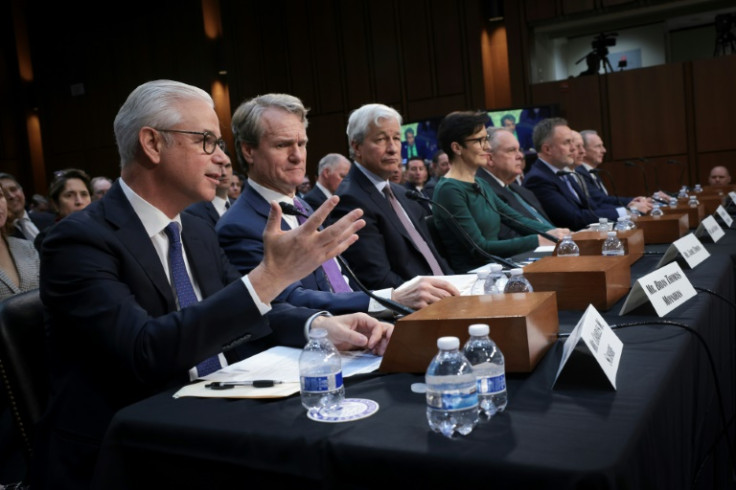
The CEOs of eight top U.S. banks visited Capitol Hill on Wednesday to testify against Basel III Endgame, the final stages of a financial regulatory regime that's been in the works for 15 years.
Testifying at the Senate Banking Committee hearing were the leaders of Wells Fargo, Bank of America, JP Morgan Chase, Citigroup, State Street, BNY Mellon, Goldman Sachs and Morgan Stanley.
All eight voiced horror at the prospect of Basel III taking effect in its current form. They argued that while they have the capital to meet the new requirements, doing so would take money from loans to Main Street and raise the costs of hedging risks, which will drive up prices across the economy.
And they insisted that while their organizations seem like Goliaths, they are "a force for good." Multiple CEOs pointed to the failures of regional banks such as Silicon Valley earlier this year and said big banks helped stabilize the system. They also provided market liquidity during the COVID-19 pandemic, they said.
"We must acknowledge that there are some things that can only be done by large and complex banks," said JP Morgan CEO Jamie Dimon, adding that there is "zero evidence that U.S. banks are undercapitalized today ... I fear that propose now, study later has become a theme in Washington."
"We use our robust balance sheets to fund transformational projects," said Citigroup CEO Jane Fraser. She called the five bank failures this year an "isolated" occurrence and warned that now is a bad time to cause banks to restrict credit. "Although we don't see a drastic downturn on the horizon, history suggests that a recession is possible," she added.
But Committee Chairman Sherrod Brown (D-Ohio) took the CEOs to task for Wall Street's lobbying campaign against Basel III, which he said included plastering Washington with ads. He argued banks have been cutting their lending to small businesses, veterans and homebuyers for years, preferring to fund derivatives trading.
"Wall Street banks are actually saying that cracking down on them will 'hurt working families'? Really?" he asked. "The economic devastation of 2008 is what hurt working families."
Sen. Mark Warner (D-Va.) said he wanted to work with the banks, but "any time there is any proposed new regulation or rule, the reaction is, 'The sky is falling ... You do this, it's going to limit access to capital on Main Street.' "
Sen. John Fetterman (D-Pa.) pointed to the 2008 crisis and the bank failures this year. "Why should we believe you?" he asked.
"I think there's been a significant amount of regime change made" since 2008, countered Bank of America CEO Brian Moynihan.
Republicans sounded a note of caution, raising questions about the knock-on effects of the regulations for Main Street.
"[These regulations] will ultimately hamper consumer choice," said Ranking Member Tim Scott (R-S.C.), adding that his letter calling on the withdrawal of the proposed regulations has been signed by 80% of his Republican colleagues. "If regulations continue to increase the costs of providing a loan, I fear that banks will decrease lending," he said.
"When they try to go after the big guys, it's the American consumer who will suffer," said Sen. Mike Rounds (R-S.D.).
Regulators took some criticism from senators, with the Federal Deposit Insurance Corp. (FDIC) coming under fire for recent revelations in the Wall Street Journal of a "toxic atmosphere" rife with sexual harassment and hard drinking.
After multiple senators referenced the FDIC's problematic culture, Dimon quipped, "I think the American public should know that banks pay for the FDIC... And I would love to take it over, and take it off your hands, and manage it myself."




